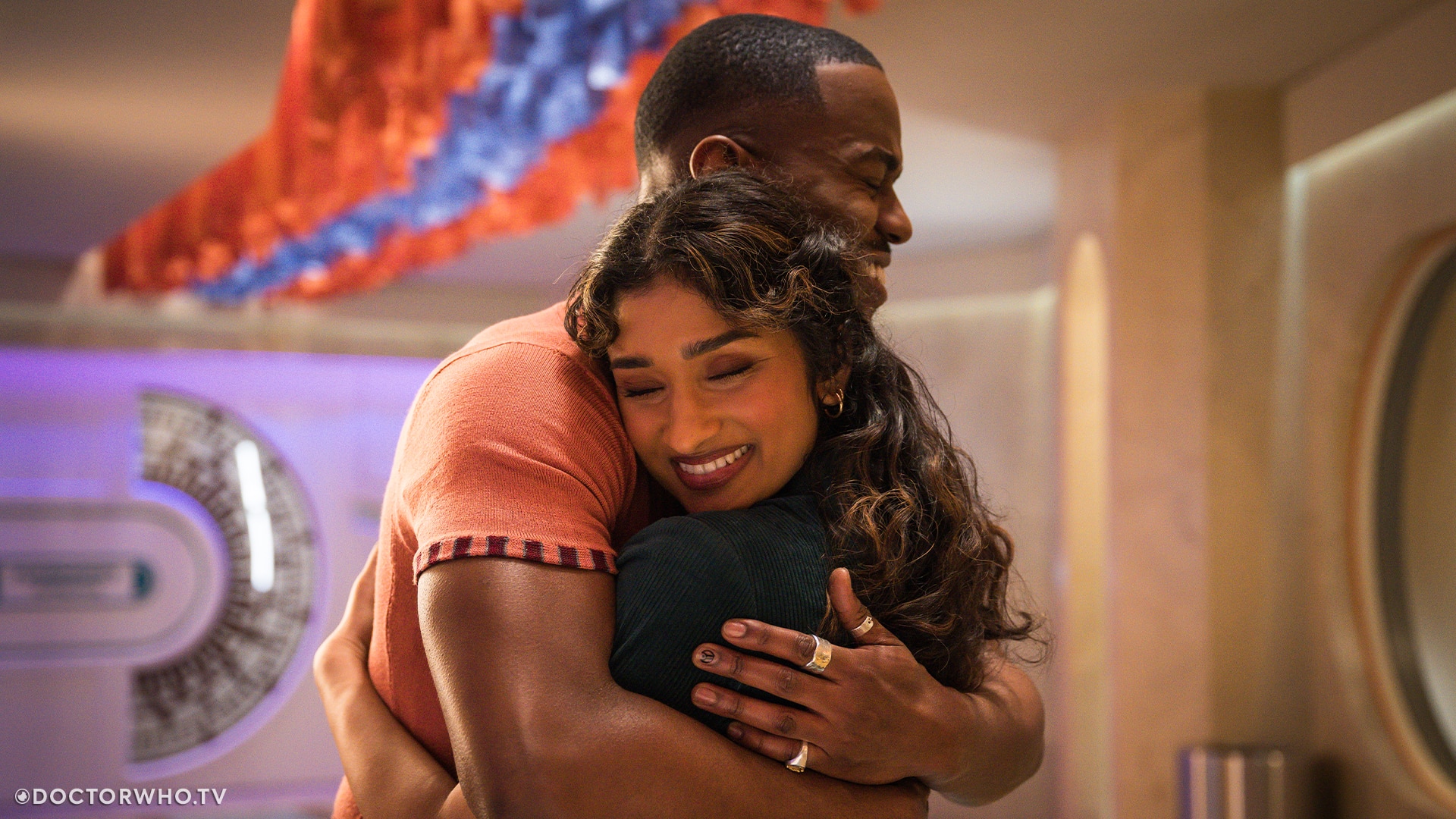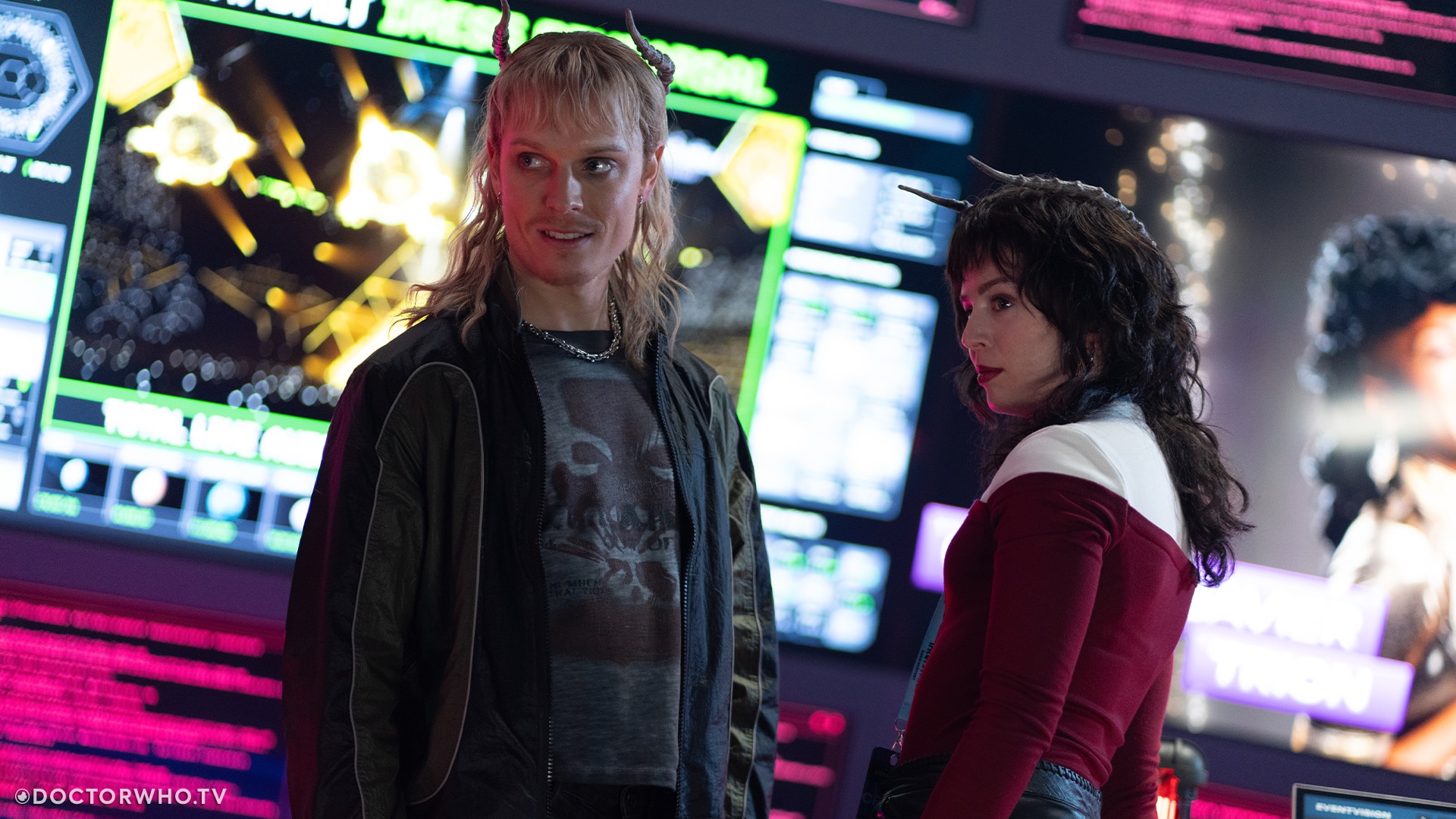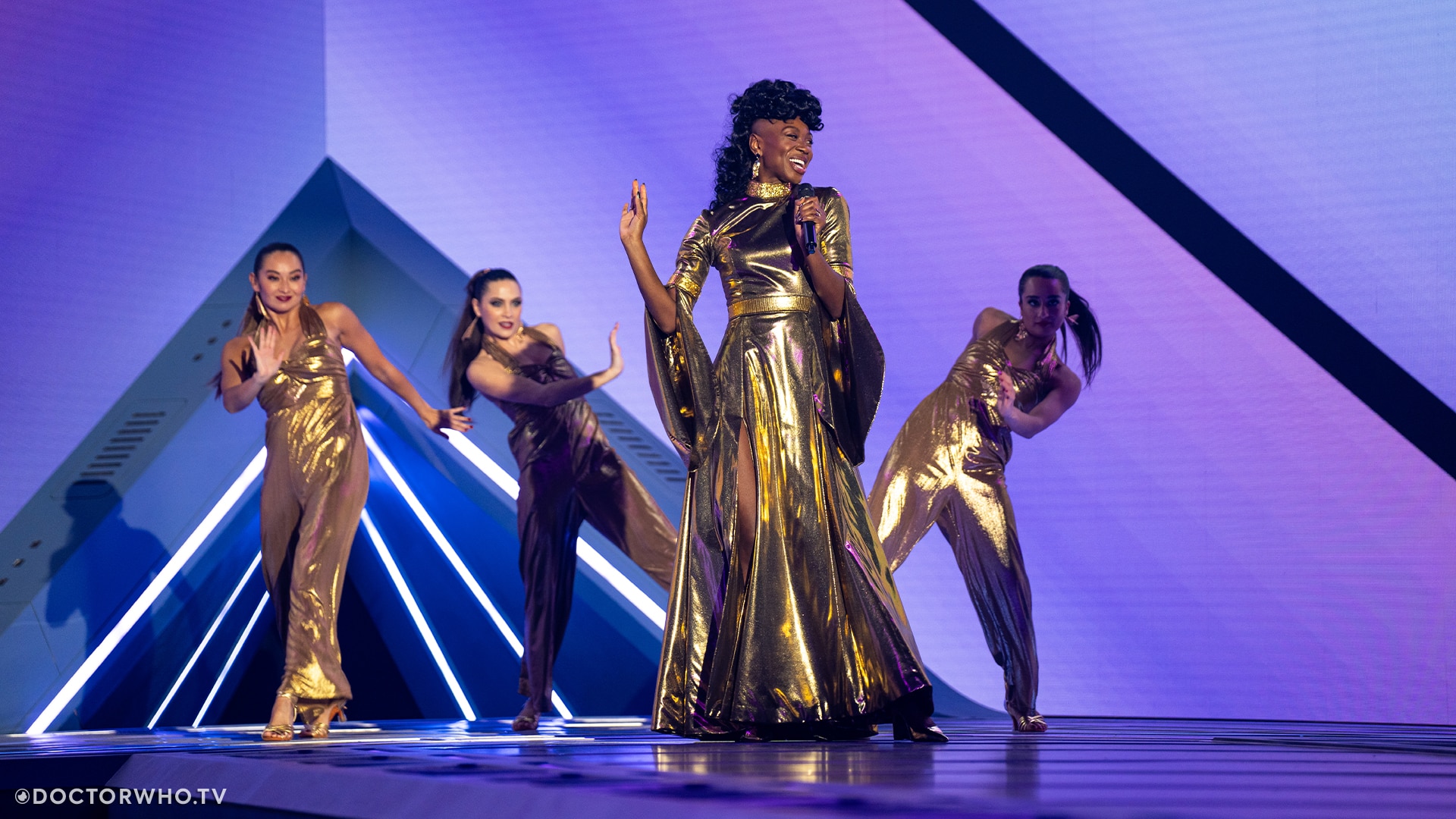May 22, 2025
The writer of The Interstellar Song Contest shares all about writing ‘Eurovision in space’ and setting up Season 2’s epic finale…
The Interstellar Song Contest has something for just about every Doctor Who fan – outer space hi-jinks; hundreds of rubber-masked aliens; a glimpse at the Doctor’s complex morality; and the return of not one, but two beloved characters from the Classic era.
Behind this episode’s script is writer Juno Dawson, making her TV series debut after writing two seasons of audio drama Doctor Who: Redacted and Thirteenth Doctor novel The Good Doctor. We spoke to Juno about all the exciting reveals of the episode, bringing back childhood icons, and the surprising nuance at the heart of ‘Eurovision in space’…

Welcome to the Whoniverse! Tell us a little bit about how your involvement with the latest season came about?
I had been door-stopping Russell [T Davies] since the day they announced that he was coming back to Doctor Who! I had a working relationship with Bad Wolf on some original stuff as well, so I was a familiar face in Cardiff; and I made it very, very clear that should there be a place to be on Doctor Who, I would drop everything.
Planning for Season 1 came and went, but then in January 2022 I got an email from Russell saying, “What do you think of Eurovision meets Die Hard?” and I immediately just replied, “Yes!” I thought about it for a couple of hours, and replied again with, “Okay, I'm ready. What do I need to do?”
I've always said when the call comes from the Whoniverse, I would always say yes – because it would be such a betrayal of the young fan who grew up on Doctor Who not to!
Your Whoniversal writing credits also include Doctor Who: Redacted and The Good Doctor. How do these experiences differ with writing for the TV series?
The big difference is working with a showrunner like Russell. I’ve also been writing for TV since around 2017, so I kind of knew the gig, and this episode was very collaborative with Russell – I’d read The Writer’s Tale and knew how he worked.
Joining a TV series as writer creates the opportunity to bring my voice; but ultimately this is not my show, and these are not my toys. Throughout pitching the plot of my episode to Russell, he would add, “There’s this bit you need to know about! Oh, Mrs Flood, you need to know about her!” - so it was very collaborative. It becomes an exercise in merging the originality of the story, and original characters of mine like Gary, Mike and Cora into the bigger picture of everything that’s going on in Season 2.
Speaking of which - how much of the series arc were you aware of when you began the writing process?
It was so long ago that I got the gig – they were still filming The Church on Ruby Road! So that’s how far back the process goes, and so naturally things change, and I had to be prepared to make changes.
But the story arc was always going to include the Rani – when Russell told me I thought he was kidding! Of course I didn’t tell anyone, not even my husband, and wrote my episode; then when the time came to add Mrs Flood’s arc in, I let Russell take the lead.

You’ve said previously that one of your earliest Doctor Who memories was of 80s classic Time and the Rani - tell us a bit about bringing this iconic villain back!
One of my formative memories! Having Kate O’Mara and Bonnie Langford onscreen dressed the same, that stays with you. People have been anticipating the return of the Rani for 20 years – any new woman in Doctor Who has fans saying, “Bet that’s the Rani,” but we got there in the end.
We’ve had Mrs Flood for two seasons, but my episode is the first time the Rani is out of the Time Lord closet. So we talked about Kate O’Mara’s character and performance; but we didn’t want Archie Panjabi to get too hung up on it, like how John Simm didn’t play his Master very closely to Anthony Ainley or Eric Roberts. It was important that Archie brought herself to the role, because we think she’s fabulous; and this isn’t a direct continuation of Time and the Rani, in a way it’s almost a fresh start for the character.
What makes this Rani and the Fifteenth Doctor’s dynamic different to the past?
Without giving too much away for the finale, this is a Doctor and a Rani of a different time. The annihilation of the Time Lords has affected both these characters in different ways – some of which you can see in my episode. The way the Doctor is affected by the attack on the Arena comes from a place of trauma; and I think that’s something we should expect of the Rani as well.
We do get to see Ncuti Gatwa’s Doctor at his most angry, vengeful and violent in this episode. How did it feel to show this new side of the Fifteenth Doctor?
At first, I approached this quite tentatively, but Russell encouraged me and said, “Let’s push it.” Kid commits this great atrocity of launching 100,000 people into space; and from the Doctor’s perspective, he doesn’t know at that point if he can bring all those people back. It’s attempted murder on a scale not often seen in Doctor Who, and he believes it. He believes Belinda is dead, that he has failed her, and it brings out a very bad, furious side of the Doctor.
We’ve seen it before but not in a while – and it’s why one of the recurring themes of Doctor Who is the importance of a human companion, because they remind the Doctor of his own humanity.

What do you hope people will take away from this episode and the plight of the Hellions?
I was inspired by ongoing events at the time to write the Hellions as this ‘forgotten race’ – Kid is murderous and hugely misguided, but I think it’s important that baddies don’t always think they’re baddies. In Kid’s messed-up mind, he is drawing attention to the plight of the Hellions, but in the most indefensible way possible. It’s why the Doctor sizes him up as someone who enjoys killing, regardless of his motives.
It’s what I loved about writing this episode; about the moral contradictions that can exist in people’s heads, but also the contradiction of the premise itself. It’s ‘Eurovision in space’, but what’s the real meat in that sandwich? What’s it really about? There are complicated questions in real life that this episode mirrors; and it’s interesting as an artist to take those tricky realities and create art about them, to try and make sense of the world that we're living in.
This episode also features the “return” of Carole Ann Ford as the Doctor’s granddaughter Susan, for the first time in over 30 years! Tell us how that came about?
As a fan, that was absolutely mad! It came about very organically – at the time I wasn’t sure how much of a nod to Gallifrey or the Doctor’s past Russell would want in the script. Plus, I hadn’t seen Season 1 yet, so I wasn’t aware there would be all these references to Susan. Over time there were revisions and rewrites until Russell hit the green button and said, “Let’s try and get Carole Ann Ford back.”
I just can't believe it's in my episode. I'm also really bummed out that I wasn't there on the day Carole was on set!
The Interstellar Song Contest features a whole host of assorted aliens from across the galaxy! Have you given much backstory to the myriad of acts and attendees from across the universe?
Absolutely hats off to Neil Gorton and Millennium FX for all those! I think we had about 250 supporting artists. Obviously, we had to be careful; with everything going on with Earth in the season arc, none of the crowd are technically Earthlings.
The Hellions were the characters that got the real backstory – we delved a lot more into their past on Hellia and their family connections originally but lost a lot of that due to time and budget. But for the level of detail required in creating the Song Contest - right down to the graphics – I had to come up with 40 contestants from 40 worlds with 40 song titles. They exist on a hard drive somewhere.

How involved were you in the songwriting process, including Cora’s aria for Hellia?
Not much initially, as I didn’t want to step on [Doctor Who composer] Murray Gold’s toes; so, at first, I wrote, “Enter song here,” in the script, but the lyrics very much became a collaboration between Russell and me. He wrote most of Cora’s original song ‘My Big Feet’, which I added to, plus Liz Lizardine’s song. ‘Dugga Doo’ and Cora’s aria were all Murray, but I translated Cora’s lyrics.
[Read that translation on The Interstellar Song Contest Story page.]
What should Doctor Who fans watch next if they loved this episode?
Well obviously, hold on tight, because it’s nearly time for episode 7, Wish World! You only have half the answers at the moment. You’ll get to properly meet the Rani and see more of her dynamic with Mrs Flood. Now would also be the time to seek out The Mark of the Rani and Time and the Rani [on BBC iPlayer in the UK] – Kate O’Mara was a great villain in these.
In terms of my episode, and the others that really inspired me in balancing the frivolous with the emotional, is Bad Wolf/The Parting of the Ways from Series 1. You’ve got the silliness of the Anne Droid, but you also feel the tragic death of Lynda with a Y. Series 1 has aged like wine, it slaps.
Lastly, if you could cryogenically freeze any act to represent Earth in the Interstellar Song Contest, who would they be?
Someone who I feel perhaps didn't get the best shot within recent memory would be Lucie Jones [UK Eurovision entry 2017]. That's quite a niche choice, but had she a slightly more memorable song, I think she could have won it.
She did really really well, as did Sam Ryder [2022]. But I think he really got his flowers, whereas I think Lucie maybe didn't get as much recognition. But I've seen her in a couple of West End shows, and she was great.
The Interstellar Song Contest, written by Juno Dawson, is now streaming on BBC iPlayer in the UK and Disney+ outside of the UK where available. Find out more here.









